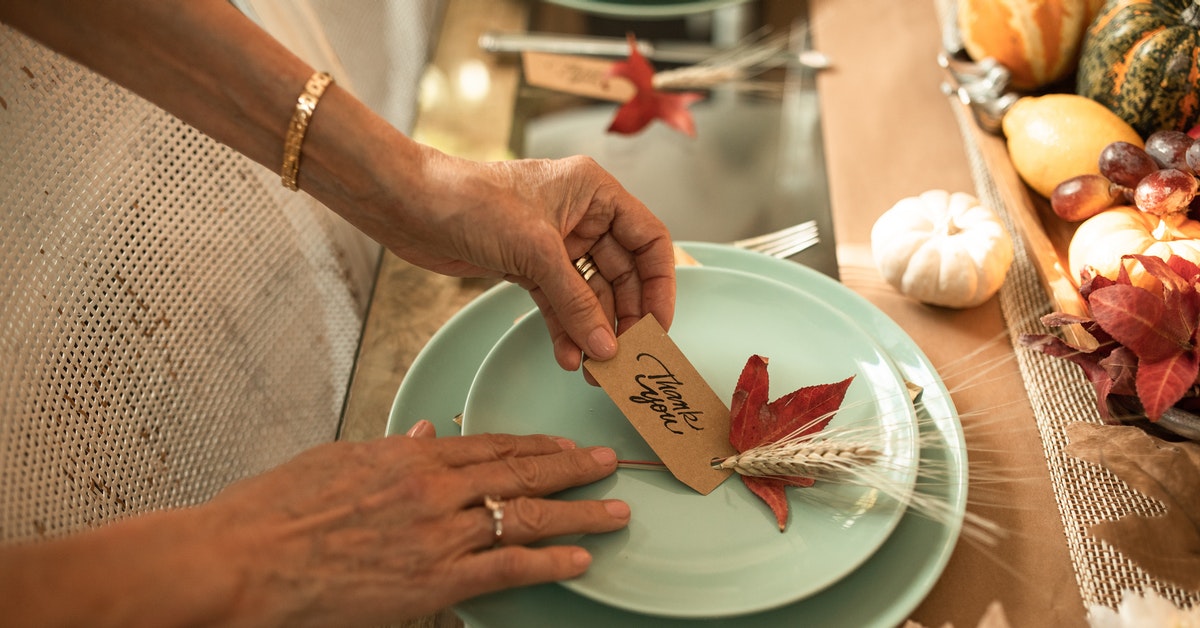Thanksgiving is a celebration of food and family, but unfortunately, it can also be a stressful time, especially for people watching their weight. It is possible to enjoy the holiday while still taking care of yourself. Here are three tips on how to have a healthier, less stressful Thanksgiving.

1. It’s All About Portions
If your main goal for the holiday is to watch your waistline, you’re in luck. It’s not as hard to cut calories on Thanksgiving as it might seem. You can eat anything you want as long as you are mindful of how much you’re eating. Focus on the special foods you don’t typically eat at other times of the year and take small portions of each. Turkey is a great source of lean protein, so if it’s one of your favorites, you could fill up on that and take a tiny bit of the other more calorie-heavy foods like stuffing.
Adjusting your mindset before you head to dinner can help you control your portions. Since humans have spent much of history struggling to get enough to eat, our brains often want us to stuff ourselves when we see a table loaded with food. Taking control of this old programming is a key part of learning to eat better. Remind yourself that the main thing you want out of this meal is the taste of traditional foods you look forward to. A small portion provides just as much flavor as a larger portion, and allows you to enjoy more flavors without going way over your calorie limit. Fattier or carb-heavy foods and creamy pies are high in calories, so consider taking less of these and more of veggie or lean meat-based dishes. Some good news for traditionalists–pumpkin pie is typically lower in calories than other pies, coming in at around 300 calories for ⅛ of the pie.
Eat slowly and listen to your body. Stop eating when you feel almost full and wait twenty minutes. If you still feel hungry after twenty minutes, have a bit more to eat. It takes a while for our bodies to know if we have satisfied our need for food. Giving your body that time to decide can keep you from going overboard. After all, it’s not just calories that are on the line. No one wants to spend Thanksgiving night with indigestion from overindulging.

2. Don’t Skip Meals
Weight and health are about more than the calories in minus calories out equation you’ve heard about a thousand times. Our hormones, including insulin and the stress hormone cortisol, also influence how we store fat. Blood sugar spikes and drops wreak havoc on this hormonal system and can cause more weight gain. They can also mess with your mood and increase anxiety– not what anyone needs right before the big family get-together.
Keeping your blood sugar stable throughout the day will help you feel better and make Thanksgiving dinner less likely to go straight to your hips or tummy. Of course, the key to keeping blood sugar stable is to eat regularly throughout the day. You may be tempted to skip a meal in an attempt to cut out some calories, but this will do more harm than good. If you show up to Thanksgiving starving, you will be more likely to overeat. Instead, aim to eat a few small meals before dinner. Include protein and some carbs in each to keep your blood sugar stable. They don’t have to be calorie-heavy. You could eat around three hundred calories for each, as long as they keep you feeling satisfied. Including whole grains or vegetables with a high fiber content will keep you feeling full longer and help your body regulate your blood sugar. This way, you can show up to dinner feeling ready to eat mindfully.

3. Stress Less
The holidays can add extra stress to our already busy lives. You might feel stressed about cooking and cleaning, travel, or how to get through several hours with your in-laws. In addition to stealing some of the joy of the holidays, stress can also exacerbate chronic health problems, increase anxiety and depression, and lead to unhealthy eating patterns. When you feel stressed, ask yourself, “Is this thing I’m stressing about worth the side-effects of stress?” Often the answer will be “no.”
We now know that chronic stress is one of the worst things for our health. It causes persistent inflammation and can be a factor in everything from Crohn’s to cancer. Managing your stress levels throughout the holidays is one of the best gifts you can give your body and your mind. Deep breathing, meditation, exercise, and mindfulness are all helpful for regulating stress.
Mindset is also key. Thanksgiving is about being grateful, and incidentally, researchers have found that people who make a habit of counting their blessings experience less anxiety and stress. Your holiday may not live up to all your expectations, but writing down or reciting in your head the things you are grateful for can help you enjoy the day anyway. Consider starting a daily gratitude journal. You don’t have to spend a lot of time on this; just jot down a few things you are grateful for at the end of each day. Research has shown that this habit can increase feelings of well-being and resilience, even after the holidays are over.
Healthy Lifestyle Support in Tennessee
At Stanlick Chiropractic, we help our clients meet their wellness goals. This includes lifestyle and nutritional advice as well as treatments like spinal adjustment. If the stress of the holidays is taking a toll on your health, come in and see us. You can now use your HSA/FSA to purchase orthotics, supplements, and other medical equipment. Happy Holidays!

